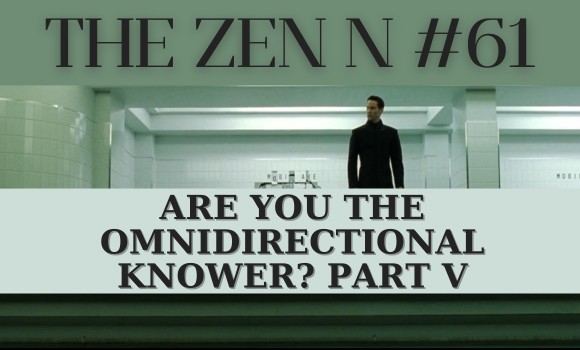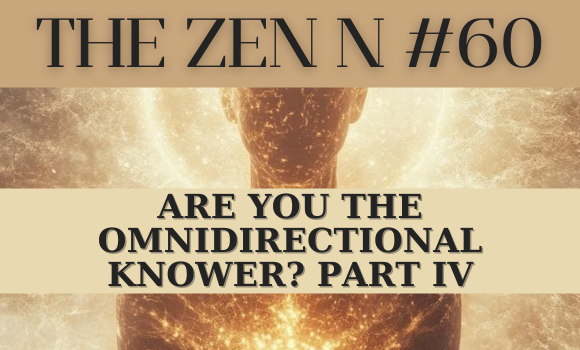The Zen N! #46
Reverse-Engineering Naval Ravikant.

The Focus of The Newsletter
This Week's Newsletter Contains,
The EZ Question XI: - Case Study: NAVAL RAVIKANT - Part III
The EZ Question XI: Case Study: Naval Ravikant - Part III
In this work, I use the processes described in The EZ Question to find a core pursuit or goal.

NAVAL RAVIKANT

Entrepreneur and Investor. Naval is the founder of Angellist, Epinions, and Vast.com. He is an Angel investor in Twitter, Uber, Yammer, and 100+ more. Naval has become widely followed for his thoughts on startups, investing, crypto, wealth, and happiness.

Naval has for decades been the authoritative voice of the Twitter-sphere.
Let’s Easily Reverse-Engineer This:
Problem: How Can I Know The Long-Term Effect Of My Action And Make a Decision Based On That Information?
Solution: By developing a calm mind.
Why Would Developing A Calm Mind Be The Solution To Seeing Long-Term Effects?
You can approach this question from a top or bottom angle.
From The Top:
The more calm the mind,
the more clearly one will be able to look at actions and their effects.
From The Bottom:
Using Munger’s Inverse Thinking:
How could I absolutely ensure that I cannot know the long term effects of my actions?
One can achieve this by developing the most clouded and agitated mind possible. This will ensure that it will be impossible to observe actions and effects.
If one like Naval looks at his future:
The more time of his life spent in a mind that is not calm,
The more suboptimal the results of his future will be.
The longer the wait to solve this issue as the priority problem,
the results of your life will be less optimal than they would have been if you had addressed this problem first.
Every day spent with the problem unsolved is leading to a suboptimal future.
Why?
The decisions that effect the future outcome were made from a mind that could not see the long-term effects of those decisions.
The Cost:
It is hard to see the cost of invisible factors that cause outcomes.
However, you can observe costs in this way with this paraphrased insight from Alex Hormozi:
If you are making $50,000 a year,
Not knowing how to make $1,000,000 a year is costing you:
$950,000 a year.
Not having that information is costing you $950,000 a year.
In this same way,
you can calculate the cost of not developing a calm mind.
To do this, you compare two scenarios.
How Would The Next 20 Years Of My Life Turn Out If I Made All Of My Decisions From An Unclear Mind?
How Would The Next 20 Years Of My Life Turn Out If I Made All Of My Decisions From A Clear Mind?
Once the cost of not solving this problem is recognized, the problem to solve is simple:
How Do I Get A Calm Mind,
A Calm Internal Mental State?
After asking this question, the mind asks,
"How hard is it to get a calm mind?"
What the mind is really asking is,
"How much does it cost me to get a calm mind and do I want to pay that cost?"
If you have taken the future into consideration,
the cost of:
Not Knowing How To Have A Calm Mind
is incalculably higher than whatever the cost of Knowing may be.
The mind then asks,
"What is a Calm Mind?"
"Have I Already Had A Calm Mind Before?"
"Is It Possible To Always Have A Calm Mind?"
"What Does A Calm Mind Mean?"
These are questions that one can take to begin a search.
It doesn't matter what your qualifications are, or who you think you are, or how you think you are,
all it takes is establishing this pursuit as the priority, as the goal.
You Can Do This Because:
The odds are against you. The distractions around you make it difficult to focus. The mind is untrained and like monkeys swinging on vines.
There are negative labels you've agreed with about what your mind can do and what you're capable of.
But it is possible.
Even if your own thoughts don't agree,
You can act despite your own thoughts.
You, personally, you, specifically, you,
can master your own mind.
Why?
Because Your Mind Is More Powerful Than Your Thoughts Think It Is.
When the priority has been established as the focus, one can search for a solution.
As is the claim of this series, if you ask a question you will get the solution.
Start = Question.
End = Solution.
The Beginning Is The End.
The Starting Point Determines The End Point.
Start = End.
Question = Solution.
In simple terms,
Pursuing The Right Question Is What Leads You To The Right Goal.
Why Does This Matter?
"But HOW do I do that?"
This Is How.
- You establish the target in your mind,
- You set an intention that the target is priority so that your mind knows that it is the target,
- You begin asking questions and looking for solutions.
Easy Questions:
What Is It I Want?
What Question Can I Ask To Pursue What I Want?
On Identifying The Best Teachers:
“If they are giving you actionable, high quality advice that acknowledges that it is a difficult journey and it will take a lot of time,
then I think that is realistic.”
- Naval Ravikant
Thank You For Reading!
Questions and Feedback
Do you have a question you would like answered on the newsletter or feedback you'd like to share?
You can reach out anytime contacttylerchoice@gmail.com.
P.S.
I'm learning a lot right now, and learning how to teach the skills I've been learning. I'll disclose more soon. I'm excited! 🤩✨✨✨
Be Blessed and have a Wonderful Week!




